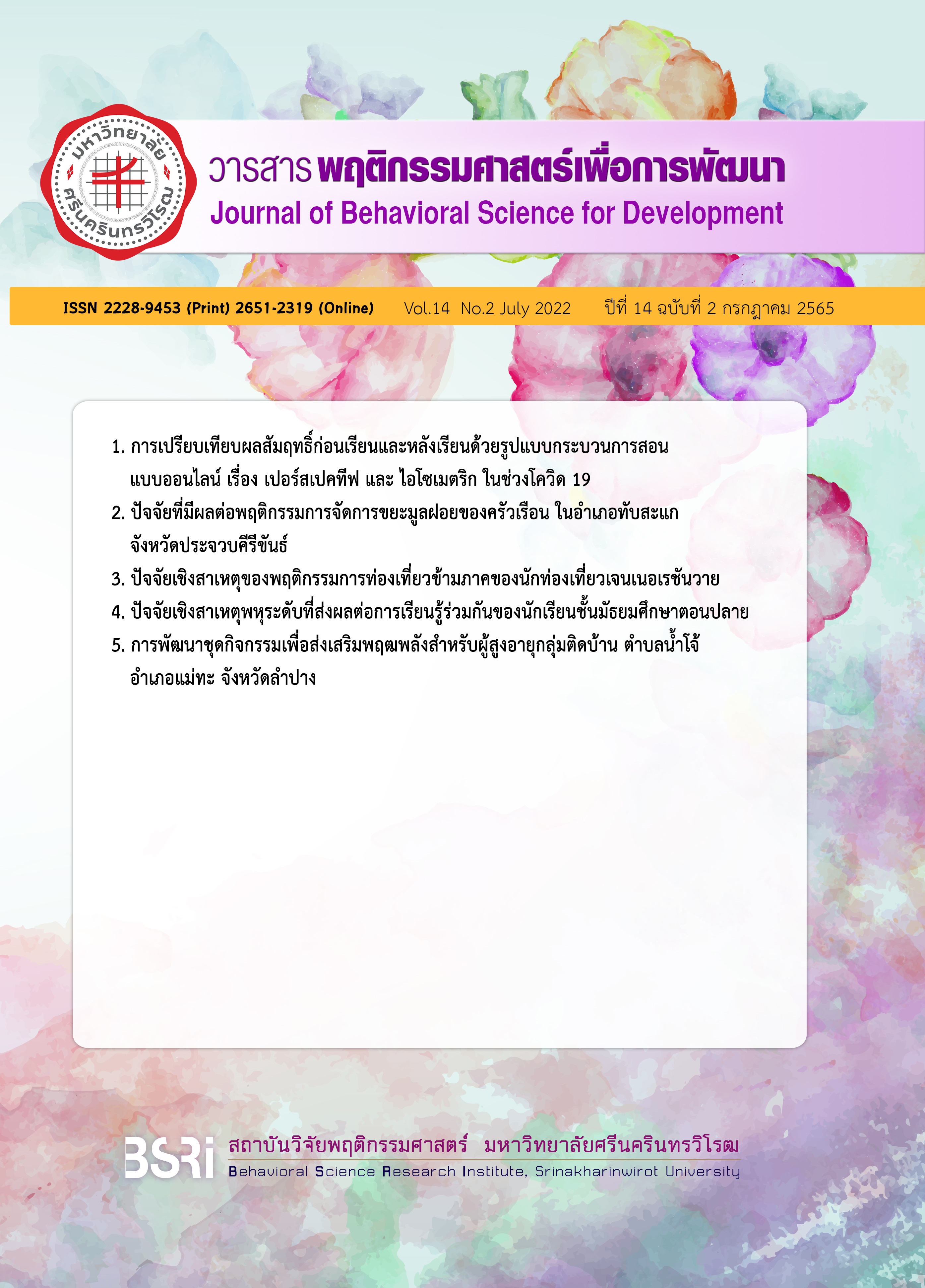Factors Affecting Solid Waste Management Behaviours of Households in Thap Sakae District, Prachuap Khiri Khan Province
Keywords:
solid waste, household, theory of planed behavior (TPB), factors predicting, Thap Sakae DistrictAbstract
The correlational research aimed to describe the factors affecting solid waste management of the household. The samples were 403 representatives of households and living in Thap Sakae district, Prachauap Khiri Khan Province over 6 months. The theory of planned behavior (TPB) was applied as a research conceptual framework by using the questionnaire. Descriptive statistics and inferential statistics composing Chi-square test, Pearson correlation and Multiple regression analysis were used to analyze data. The results revealed that most sample had improper solid waste Management behaviours (67.7%). Three factors were statistically significantly related to solid waste management behaviors, composing of subjective norms (r = .171, p < .001), perceived behavior control (r = .281, p < .001), and behavioral intention (r = .248, p < .001). The results of the multiple regression analysis composing of behavioral intention (β = .301, p < .001), and perceived behavioral control (β = .282, p < .001). These two factors could statistically predict solid waste management behaviors up to 27.0 % (Nagelkerke R2 = .27) Therefore, officers of sub district administrative organization or sub district municipality, communities, and various sectors should collaborate to organize activities in regard to solid waste management. These activities will increase the confidence and skills, and will not be seem as obstructing the management of solid waste at the source.
References
Adzawla, W., Tahidu, A., Mustapha, S., & Azumah, S. B. (2019). Do socioeconomic factors influence households’ solid waste disposal systems Evidence from Ghana. Waste Management & Research, 37(1), 51–57.
Ajzen, I. (1975). Belief, attitude, intention, and behavior: an introduction to theory and research. Addison-Wesley.
Ajzen, I. (1980). Understanding attitudes and predicting social behavior. Englewood Cliffs.
Ajzen, I. (1985) From intentions to action: a theory of planned behavior. In J. Kuhl, & J. Beckmann (Eds.), Action-Control: From Cognition to Behavior, Springer-Verlag, Heidelberg (pp. 11-39). http://dx.doi.org/10.1007/978-3-642-69746-3_2
Ajzen, I. (1991). The theory of planned behavior. organizational behavior and human decision processes, 50(2), 179–211.
Ajzen, I. (2002). Perceived behavioral control, self-efficacy, locus of control, and the theory of planned behavior. Journal of Applied Social Psychology, 32(4), 665-683.
Ajzen, I. (2006). Constructing a theory of planned behaviour questionnaire: conceptual and methodological consideration. http://www.people.umass.edu/aizen/pdf/tpb.measurement.pdf
Ajzen, I. (2019). TPB questionnaire construction. https://people.umass.edu/aizen/pdf/tpb.measurement.pdf
Ajzen, I. (2020). The theory of planned behavior: Frequently asked questions. Human Behavior & Emerging Technologies, 2(4), 314-424.
Armitage, C. J., & Conner, M. (2001) Efficacy of the theory of planned behaviour: a meta-analytic review. British Journal of Social Psychology, 40, 471-499.
Bloom, B. S., Hasting, J. T., & Maduas, G. F. (1971). Handbook of Formative and Summative Evaluation of student Learning. McGraw-Hill Book.
Ministry of Public Health. (2021). Department of Health worried about overflowing infectious waste. https://multimedia.anamai.moph.go.th/news/130864/
Halder, P., & Singh, H. (2018). Predictors of recycling intentions among the youth: a developing country perspective. Recycling Journal, 3(38). https://doi.org/10.3390/recycling3030038
Hoornweg, D., & Bhada-Tata, P. (2012). What a waste: a global review of solid waste management. Urban Development Series Knowledge Papers, 15, 87-88. http://hdl.handle.net/10986/17388
Ittiravivongs, A. (2009). Factors influence household solid waste recycling behaviour in: an integrated perspective. WIT Transactions on Ecology and The Environment, 167(1), 437-448. [in Thai]
Khongpirun, W., Thiphom, S., & Chanthorn, W. (2017). Factors associated with waste management behaviors among Pongpa village, Kaeng Sopha sub-district, Wang Thong district, Phitsanulok province. Journal of Health Science, 26(2), 310-311. [in Thai]
Minghua, Z., Xiumin, F., Rovetta, A., Qichang, H., Vicentini, F., Bingkai, L., Giusti, A., & Yi, L. (2009). Municipal solid waste management in Pudong New Area, China. Journal of Waste Management, 29(1), 1227–1233.
Osgood, C. E., Suci, G. J., & Tannenbaum, P. H. (1957). The measurement of meaning. Illinois Press.
Phetphum, C., Sưasing, B., Chanplaeng, W., Puttapum, W., & Phongpricha, B. (2018). Factors affecting behavior in household solid waste management among housewives in Khao Kho district, Phetchabun province. Journal of Science and Technology, Ubon Ratchathani University, 20(1), 203-212. [in Thai]
Pollution Control Department. (2019). Report of Thailand Pollution Situation 2019. https://www.pcd.go.th/publication/8013/
Pollution Control Department. (2020). Report of Situation of community solid waste disposal sites in Thailand, year 2020. https://thaimsw.pcd.go.th/articledetail.php?id=68
Ransikul, P. (2010). The garbage management of sub district Admistrative Organization in Thapsakae District, Prachuap khiri khan province. https://dric.nrct.go.th/index.php?/Search/SearchDetail/233953
Regional Environment office 8th (Ratchaburi). (2019). Report of Environmental Situation 2019. https://www.pcd.go.th/publication/8013/
Shen, L., Si, H., Yu, L., & Si, H. (2019). Factors Influencing Young People's Intention toward Municipal Solid Waste Sorting. International journal of environmental research and public health, 16(10), 1-19.
Strydom, W. F. (2018). Applying the theory of planned behavior to recycling behavior in South Africa. Recycling journal, 3(43), 1-20.
The Bureau of Registration Administration. (2020). Household data. https://stat.bora.dopa.go.th/stat/statnew/statMenu/newStat/home.php
Thongchuay, N. (2014). People participation in solid waste management services in Tumbon Lankrabue Minicipal district, Kamphaeng Phet province. Journal of Community Development Research (Humanities and Social Sciences), 7(2), 47-68. [in Thai]
Watpanichakul, K. (2019). Household solid waste management behaviors in Samut sakhon municipality, Samut sakhon province. Interdisciplinary Studies journal, 19(2), 55-72. [in Thai]
Wayne, W. D. (1995). Biostatistics: A Foundation of Analysis in the Health Sciences (6th ed.). Wiley & Sons.
Xu, L., Ling, M., & Shen, M. (2017). Understanding Household Waste Separation Behaviour: Testing the Roles of Moral, Past Experience, and Perceived Policy Effectiveness within the Theory of Planned Behaviour. Sustainability journal, 9(4), 1-27.
Downloads
Published
How to Cite
Issue
Section
License
Copyright (c) 2022 Journal of Behavioral Science for Development

This work is licensed under a Creative Commons Attribution-NonCommercial-NoDerivatives 4.0 International License.



